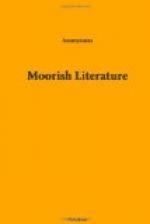Ahmed went home, and took as provisions for the journey forty dates of the deglet-nour variety, putting them into his pocket. He mounted his steed and departed.
He goes and goes without stopping, until he comes to the country of the sand. The charger throws his feet forward and buries himself in the sand up to his breast, but soon stops, conquered and worn out by fatigue. Ahmed el Hilalieu then addresses him:
“My good gray horse, of noble mien,
the sand,
The cruel sand would eat your very eyes.
The air no longer thy loud whinnies bears,
No strength is left thee in thy head or
heart.
The prairies of Khafour I’ll give
to thee,
With Nouna’s eyes I’ll quench
thy thirst, by God
A mule’s whole pack of barley shalt
thou have
That Ben Haddjouna shall bring here for
thee.”
In his turn the steed spoke and said: “Dismount, unfasten the breast-strap, tighten the girth, for some women are coming to show themselves to us in this country.” Ahmed unfastened the breast-strap, then remounts and departs. While he proceeds he sees before him the encampment of a tribe, and perceives a horseman coming, mounted on a white mare, engaged in herding camels.
“Blessings upon you!” cried Ahmed; “you behind the camels!” The horseman kept silence, and would not return his salutations.
“Greetings to you,” cried Ahmed again, “you who are in the middle of the camels.” The same obstinate silence.
“Greetings to you, you who are before the camels.” The horseman still was silent. Ahmed then said: “Greetings to you, you who own the white mare.”
“Greetings to you!” replied the horseman.
“How comes it that you would not answer my greetings for so long?”
The horseman answered: “You cried to me, ’Greetings to you, you who are behind the camels,’ Now, behind them are their tails. Then you said, ‘Greetings to you, you who are in the middle of the camels,’ In the middle of them are their bellies. You said, again, ’Greetings to you, you who are before the camels.’ Before them are their heads. You said, ’Greetings to you, O master of the white mare,’ And then I answered to you, ’Greetings to you also,’”
Ahmed el Hilalieu asked of the shepherd, “What is your name?”
“I am called Chira.”
“Well, Chira, tell me where Redah lives. Is it at the city of the stones or in the garden of the palms?”
“Redah dwells in the city. Her father is the Sultan. Seven kings have fought for her, and one of them has refreshed his heart. He is named Chalau. Go, seek the large house. You will be with Redah when I see you again.”
Ahmed sets out, and soon meets the wife of the shepherd, who comes before him and says, “Enter, be welcome, and may good luck attend you!” She ties his horse, gives him to drink, and goes to find dates for Ahmed. She takes care to count them before serving him with them. He takes out a pit, closes the date again, puts them all together, and puts down the pit. He ate nothing, and he said to the woman: “Take away these dates, for I have eaten my fill.” She looks, takes up the tray, counts the dates again, and perceives that none of them has been eaten. Nevertheless, there is a pit, and not a date missing. She cries out:




